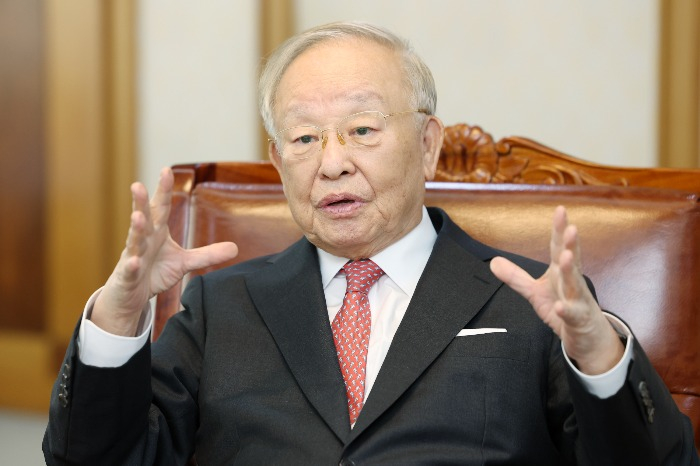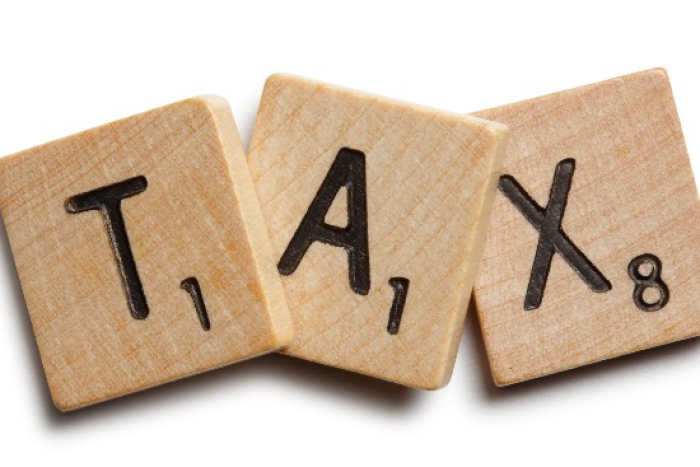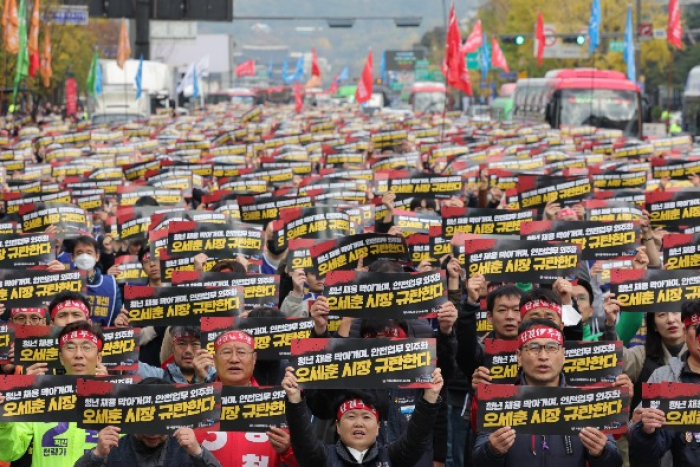Korea business lobby group eyes tax reform in new parliament
The Korea Enterprises Federation head vows to make every effort to revise seemingly labor-friendly laws
By Mar 18, 2024 (Gmt+09:00)
LG Chem to sell water filter business to Glenwood PE for $692 million


Kyobo Life poised to buy Japan’s SBI Group-owned savings bank


KT&G eyes overseas M&A after rejecting activist fund's offer


StockX in merger talks with Naver’s online reseller Kream


Mirae Asset to be named Korea Post’s core real estate fund operator



The Korea Enterprises Federation will reinforce efforts to win lawmakers’ nod to its long-desired campaign to slash corporate taxes and inheritance taxes for business owners, the world’s highest rates, as South Korea’s National Assembly is set to begin its new four-year term in May, the business lobby group’s head said in a recent interview.
The federation will also step up its push to amend seemingly labor-friendly laws and systems to enhance labor market flexibility.
“Our top three priorities are labor market development, relaxation of the Serious Accident Punishment Act and reduction of inheritance tax (for business owners) and corporate tax,” Sohn Kyung Shik, chairman of the federation, told The Korea Economic Daily in an interview last week.
“As all of them need to pass through the National Assembly, I will run in haste to the parliament as soon as the 22nd National Assembly kicks off (on May 30).”
Inheritance taxes charged by the South Korean central government are as high as 60%, compared with the OECD average of 26.5%. Corporate tax is 24%, slightly above the OECD average of 22%.
He said that such high taxes for companies and business transfers would deepen the so-called Korea Discount, or undervaluation of companies compared with their intrinsic value and put a dent in corporate investment.
South Korea has slid to 26th in terms of tax competitiveness from 15th place in 2017.
“The 21st National Assembly had reflected workers' views more than companies'. I hope the 22nd National Assembly will be different from the current session to some extent,” said Sohn.
He also leads food to entertainment-focused CJ Group as chairman. It was his first media interview after beginning his fourth term as head of the federation last month.

LABOR REFORM
The lobby group is trying to get tough with labor unions through law amendments, including prohibiting their unfair business practices and making it mandatory for employees on walkout to work extra days without pay to make up for lost workdays caused by strikes.
He said the federation will make efforts to fix the imbalance between labor and management relations he sees tilted toward the labor. Over the past 10 years, South Korean companies have suffered 38.8 lost workdays a year due to labor strikes on average, compared with 0.2 of a day in Japan, he added.
Further, it plans to reform the seniority-based wage system and shift to a performance-based one to improve productivity and labor market flexibility to woo artificial intelligence and semiconductor talent.
Last year, 65% of Korean companies with more than 1,000 employees surveyed by the Ministry of Employment and Labor adopted seniority-based wage systems.

Regarding labor reform, Korean companies are also lobbying lawmakers to modify the 52-hour workweek cap to a monthly or annual-basis one to flexibly respond to market conditions and orders from customers.
Sohn, 85, expressed concerns about business environment uncertainty in the aftermath of the parliamentary elections on April 10 amid a slowing economy.
He has been serving as the mouth of the business community for 20 years since he took office as chairman of the Korea Chamber of Commerce and Industry in 2005. Last month, he was unanimously re-elected as chairman of the Korea Enterprises Federation.
The business lobby group is also endeavoring to exclude small companies with fewer than 50 employees from the Serious Accident Punishment Act.
Under the Act, in place since 2022, business owners or heads of companies face penalties or jail terms in the event of serious industrial accidents at their workplaces.
Write to Jae-Fu Kim and Jin-Won Kim at hu@hankyung.com
Yeonhee Kim edited this article.
-
 The KED ViewLabor reform urged in Korea with higher wages than Japan
The KED ViewLabor reform urged in Korea with higher wages than JapanMar 18, 2024 (Gmt+09:00)
2 Min read -
 EconomySouth Korea’s corporate tax-to-GDP ratio hits record high
EconomySouth Korea’s corporate tax-to-GDP ratio hits record highFeb 15, 2024 (Gmt+09:00)
1 Min read -
 RegulationsS.Korea should cut inheritance, gift taxes to OECD levels: SME lobby chief
RegulationsS.Korea should cut inheritance, gift taxes to OECD levels: SME lobby chiefJan 23, 2024 (Gmt+09:00)
4 Min read -
 RegulationsS.Korea to scrap capital gains taxes on financial products
RegulationsS.Korea to scrap capital gains taxes on financial productsJan 17, 2024 (Gmt+09:00)
3 Min read -
 Samsung GroupSamsung heirs tap $2.1 bn block sale for inheritance taxes
Samsung GroupSamsung heirs tap $2.1 bn block sale for inheritance taxesJan 10, 2024 (Gmt+09:00)
3 Min read -
 The KED ViewWindfall tax on Korean banks to create quintuple burden
The KED ViewWindfall tax on Korean banks to create quintuple burdenNov 16, 2023 (Gmt+09:00)
4 Min read -
 Business & PoliticsKorea Inc.’s dividend repatriation soars on new tax breaks
Business & PoliticsKorea Inc.’s dividend repatriation soars on new tax breaksNov 19, 2023 (Gmt+09:00)
3 Min read -
 EconomyS.Korea proposes extended tax breaks for reshoring companies
EconomyS.Korea proposes extended tax breaks for reshoring companiesJul 21, 2023 (Gmt+09:00)
3 Min read


